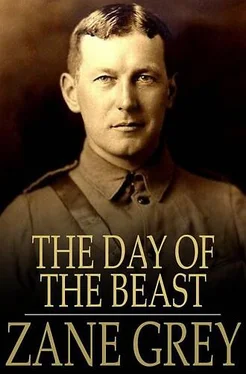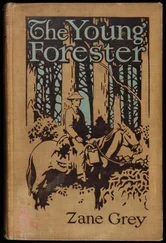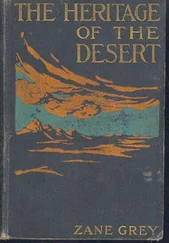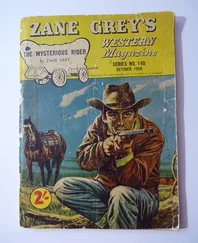Zane Grey - The Day of the Beast
Здесь есть возможность читать онлайн «Zane Grey - The Day of the Beast» весь текст электронной книги совершенно бесплатно (целиком полную версию без сокращений). В некоторых случаях можно слушать аудио, скачать через торрент в формате fb2 и присутствует краткое содержание. Жанр: Старинная литература. Описание произведения, (предисловие) а так же отзывы посетителей доступны на портале библиотеки ЛибКат.
- Название:The Day of the Beast
- Автор:
- Жанр:
- Год:неизвестен
- ISBN:нет данных
- Рейтинг книги:4 / 5. Голосов: 1
-
Избранное:Добавить в избранное
- Отзывы:
-
Ваша оценка:
- 80
- 1
- 2
- 3
- 4
- 5
The Day of the Beast: краткое содержание, описание и аннотация
Предлагаем к чтению аннотацию, описание, краткое содержание или предисловие (зависит от того, что написал сам автор книги «The Day of the Beast»). Если вы не нашли необходимую информацию о книге — напишите в комментариях, мы постараемся отыскать её.
The Day of the Beast — читать онлайн бесплатно полную книгу (весь текст) целиком
Ниже представлен текст книги, разбитый по страницам. Система сохранения места последней прочитанной страницы, позволяет с удобством читать онлайн бесплатно книгу «The Day of the Beast», без необходимости каждый раз заново искать на чём Вы остановились. Поставьте закладку, и сможете в любой момент перейти на страницу, на которой закончили чтение.
Интервал:
Закладка:
Blair thumped up on his crutch, and thumped across the hall to confront this assembly.
“Ladies and gentlemen, pray pardon me,” he said, in his high-pitched tenor, cold now, and under perfect control. “I could not help hearing your conversation. And I cannot help illuminating your minds. It seems exceedingly strange to me that people of intelligence should make the blunders they do. So strange that in the future I intend to take such as you have made as nothing but the plain cold fact of perversion of human nature! Daren Lane is so far above your comprehension that it seems useless to defend him. I have never done it before. He would not thank me. But this once I will speak.... In our group of service men—so few of whom came home—he was a hero. We all loved him. And for soldiers at war that tribute is the greatest. If there was a dirty job to be done, Daren Lane volunteered for it. If there was a comrade to be helped, Daren Lane was the first to see it. He never thought of himself. The dregs of war did not engulf him as they did so many of us. He was true to his ideal. He would have been advanced for honors many a time but for the enmity of our captain. He won the Croix de Guerre by as splendid a feat as I saw during the war.... Thank God, we had some officers who treated us like men—who were men themselves. But for the majority we common soldiers were merely beasts of burden, dogs to drive. This captain of whom I speak was a padded shape—shirker from the front line—a parader of his uniform before women. And he is that to-day—a chaser of women—girls— girls of fifteen.... Yet he has the adulation of Middleville while Daren Lane is an outcast.... My God, is there no justice? At home here Daren Lane has not done one thing that was not right. Some of the gossip about him is as false as hell. He has tried to do noble things. If he married Mel Iden, as you say, it was in some exalted mood to help her, or to give his name to her poor little nameless boy.”
Blair paused a moment in a deliberate speech that toward the end had grown breathless. The faces before him seemed swaying in a mist.
“As for myself,” he continued in passionate hurry, “I did not lose my leg!... I sacrificed it. I gave my career, my youth, my health, my body—and I will soon have given my life—for my country and my people. I was proud to do it. Never for a moment have I regretted it.... What I lost—Ah! what I lost was respect for”—Blair choked—“for the institution that had deluded me. What I lost was not my leg but my faith in God, in my country, in the gratitude of men left at home, in the honor of women.”
Friday, the tenth of January, dawned cold, dark, dreary, and all day a dull clouded sky promised rain or snow. From a bride's point of view it was not a propitious day for a wedding. A half hour before five o'clock a stream of carriages began to flow toward St. Marks and promptly at five the door of the church shut upon a large and fashionable assembly.
The swelling music of the wedding march pealed out. The bridal party filed into the church. The organ peals hushed. The resonant voice of a minister, with sing-song solemnity, began the marriage service.
Margaret Maynard knew she stood there in the flesh, yet the shimmering white satin, the flowing veil, covered some one who was a stranger to her.
And this other, this strange being who dominated her movements, stood passively and willingly by, while her despairing and truer self saw the shame and truth. She was a lie. The guests, friends, attendants, bridesmaids, the minister, the father, mother, groom—all were lies. They expressed nothing of their true feelings.
The unwelcomed curious, who had crowded into the back of the church, were the sincerest, for in their eyes, covetousness was openly unveiled. The guests and friends wore the conventional shallow smiles of guests and friends. They whispered to one another—a beautiful wedding—a gorgeous gown—a perfect bride—a handsome groom; and exclaimed in their hearts: How sad the father! How lofty, proud, exultant the mother! How like her to move heaven and earth to make this marriage! The attendants posed awkwardly, a personification of the uselessness of their situation, and they pitied the bride while they envied him for whose friendship they stood. The bridesmaids graced their position and gloried in it, and serenely smiled, and thought that to be launched in life in such dazzling manner might be compensation for the loss of much. He of the flowing robe, of the saintly expression, of the trained earnestness, the minister who had power to unite these lives, saw nothing behind that white veil, saw only his fashionable audience, while his resonant voice rolled down the aisles of the church: “Who gives this woman to be wedded to this man?” The father answered and straightway the years rolled back to his youth, to hope, to himself as he stood at the altar with love and trust, and then again to the present, to the failure of health and love and life, to the unalterable destiny accorded him, to the one shame of an honest if unsuccessful life—the countenancing of this marriage. The worldly mother had, for once, a full and swelling heart. For her this was the crowning moment. In one sense this fashionable crowd had been pitted against her and she had won. What to her had been the pleading of a daughter, the importunity of a father, the reasoning of a few old-fashioned friends? The groom, who represented so much and so little in this ceremony, had entered the church with head held high, had faced his bride with gratified smile and the altar with serene unconsciousness.
Margaret Maynard saw all this; saw even the bride, with her splendidly regular loveliness; and then, out of heaven, it seemed there thundered an awful command, rolling the dream away, striking terror to her heart.
“If any man can show just cause why they may not lawfully be joined together, let him now speak, or else hereafter for ever hold his peace!”
One long, silent, terrible moment! Would not an angel appear, with flaming sword, to smite her dead? But the sing-song voice went on, like flowing silk.
The last guest at Mrs. Maynard's reception had gone, reluctantly, out into the snow, and the hostess sat in her drawing-room, amid the ruins of flowers and palms. She was alone with her triumph. Mr. Maynard and Mr. Swann were smoking in the library. Owing to the storm and delicate health of the bride the wedding journey had been postponed.
Margaret was left alone, at length, in the little blue-and-white room which had known her as a child and maiden, where she now sat as wife. For weeks past she had been emotionless. To-night, with that trenchant command, unanswered except in her heart, a spasm of pain had broken the serenity of her calm, and had left her quivering.
“It is done,” she whispered.
The endless stream of congratulations, meaningless and abhorrent to her, the elaborate refreshments, the warm embraces of old friends had greatly fatigued her. But she could not rest. She paced the little room; she passed the beautiful white bridal finery, so neatly folded by the bridesmaids, and she averted her eyes. She seemed not to hate her mother, nor love her father; she had no interest in her husband. She was slipping back again into that creature apart from her real self.
The house became very quiet; the snow brushed softly against the windows.
A step in the hall made Margaret pause like a listening deer; a tap sounded lightly on her door; a voice awoke her at last to life and to torture.
“Margaret, may I come in?”
It was Swann's voice, a little softer than usual, with a subtle eagerness.
“No” answered Margaret, involuntarily.
“I beg your pardon. I'll wait.” Swann's footsteps died away in the direction of the library.
Читать дальшеИнтервал:
Закладка:
Похожие книги на «The Day of the Beast»
Представляем Вашему вниманию похожие книги на «The Day of the Beast» списком для выбора. Мы отобрали схожую по названию и смыслу литературу в надежде предоставить читателям больше вариантов отыскать новые, интересные, ещё непрочитанные произведения.
Обсуждение, отзывы о книге «The Day of the Beast» и просто собственные мнения читателей. Оставьте ваши комментарии, напишите, что Вы думаете о произведении, его смысле или главных героях. Укажите что конкретно понравилось, а что нет, и почему Вы так считаете.












